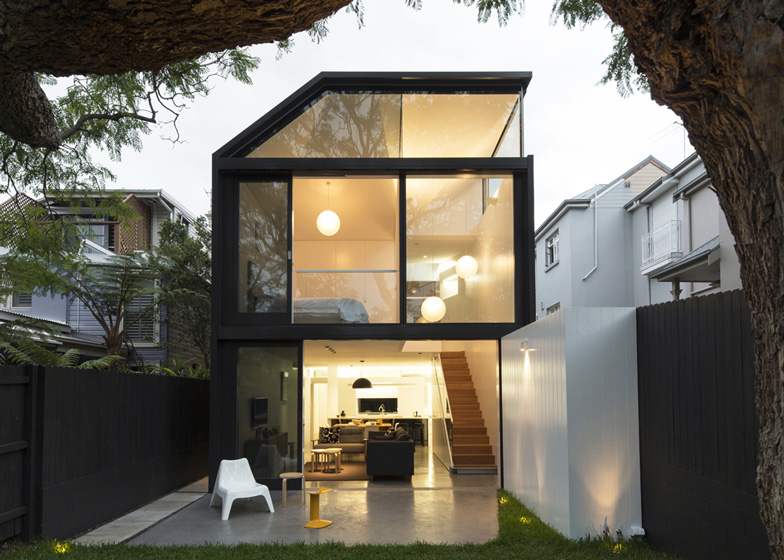Australian architect Christopher Polly has converted a small Sydney bungalow into a two-storey house by adding extra rooms behind and underneath.
The extension more than doubles the floor area of Cosgriff House, a family residence in the Sydney suburb of Annandale. At ground floor level the plan extends to accommodate a new bathroom, bedroom and study room, while the extra storey below adds a large open-plan living and dining room at the same level as the garden.
Christopher Polly designed the extension as an asymmetric volume that initially follows the hipped profile of the house's original roof but then angles up further to let in light through high-level windows.
The structure features an all-black exterior combining fibre-cement panels with black window and door surrounds, designed to complement the brown tones of the original brickwork facade.
A new staircase leads down from the ground floor to the large basement living room. The base of the stairs never meets the floor, creating the impression of a floating structure, while new storage closets are tucked into the space beneath.
Glazed panels open the living room out to the garden beyond. The architect has also integrated a system of louvred shutters that can be used to screen this elevation when residents want more privacy.
Other recently completed houses in Australia include a Melbourne residence with the silhouette of three little buildings and a Queensland house designed to withstand cyclones. See more houses in Australia.
Photography is by Brett Boardman.
Here's a project description from Christopher Polly:
Cosgriff House
The project retains its original envelope as part of its environmental, economic and planning values. A substantial lower ground living volume is sensitively inserted beneath the original fabric to harness the fall in the site towards the rear, extending deeply beneath the existing dwelling and outwards towards the garden to transform it - while a re-crafted rear ground floor above enfolds the existing rhythm of front rooms over the new lower ground below.
Both levels accept a modestly-sized lightweight addition which extrapolates existing wall alignments, gutter levels and enclosing wall heights - that at once, extends and subverts existing geometries to present an interpreted mirrored slice of the original vernacular form attached to the retained rear fabric. An eccentric roof form extrapolates the original southern roof plane to mitigate adjacent impacts - lifting to light and tree views to the east, while also folding upwards for access to northern light and sky through a sole fire-rated window along the boundary.
The majority of the project is carefully crafted within the retained masonry and hipped roof envelope. Vaulted ceilings and skylights carved within the original roof form expand volumes for access to light and sky within the middle of the ground floor - while consciously surrendered floor area permits a generous stair void that spatially expands to the lower level below, and upwards to views of the external environment to strengthen connections to its setting.
Utilities located deep within the semi-subterranean rear of the lower ground enable direct connection of the living space to the garden and jacaranda tree, while the re-worked ground floor above adds a bathroom, main bedroom and adaptable bedroom providing flexibility for future use as a study. Fenestration placement improves natural light access and promotes passive ventilation, assisted by ceiling fans and a roof venting system to exhaust trapped heat out of the original roof space.
Location: Annandale, Sydney Australia
Architect: Christopher Polly Architect
Structural Engineer: SDA Structures
Hydraulic Engineer: ACOR Consultants
Builder: R.G.Gregson Constructions
Land Size: 370 sqm
Floor Area: 167 sqm
Completion: December 2012

